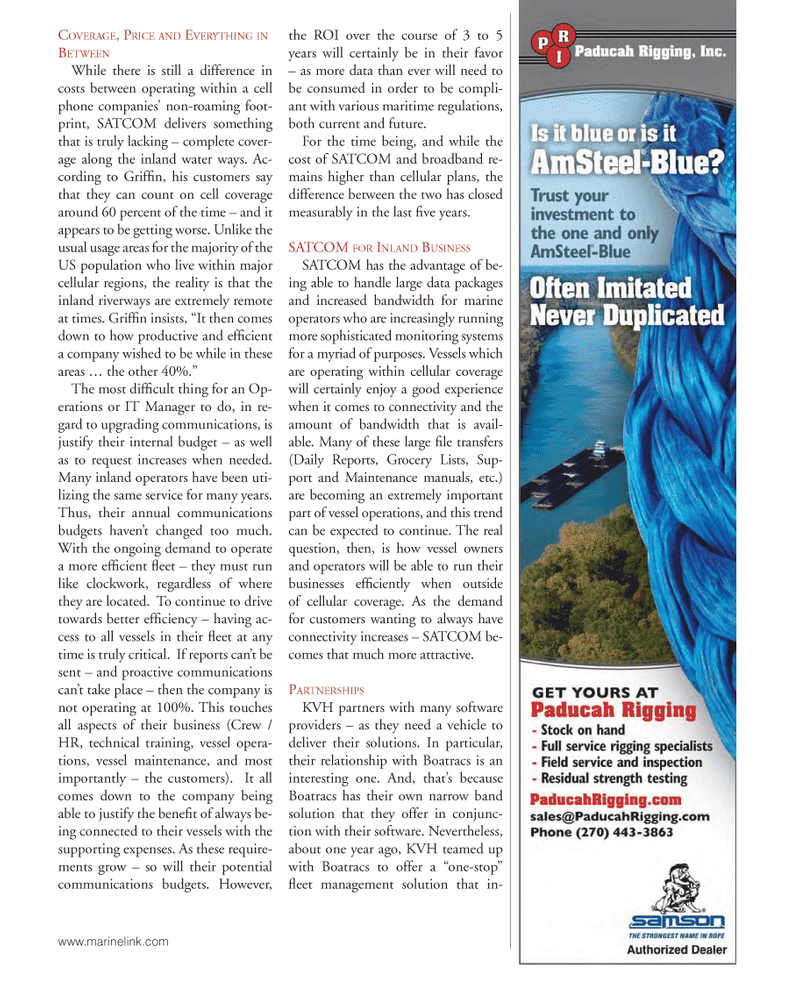
Page 33: of Marine News Magazine (July 2013)
Propulsion Technology
Read this page in Pdf, Flash or Html5 edition of July 2013 Marine News Magazine
COVERAGE , PRICE AND EVERYTHING IN BETWEEN While there is still a difference in costs between operating within a cell phone companies non-roaming foot- print, SATCOM delivers something that is truly lacking ? complete cover- age along the inland water ways. Ac- cording to Grif? n, his customers say that they can count on cell coverage around 60 percent of the time ? and it appears to be getting worse. Unlike the usual usage areas for the majority of the US population who live within major cellular regions, the reality is that the inland riverways are extremely remote at times. Grif? n insists, It then comes down to how productive and ef? cient a company wished to be while in these areas ? the other 40%.? The most dif? cult thing for an Op- erations or IT Manager to do, in re- gard to upgrading communications, is justify their internal budget ? as well as to request increases when needed. Many inland operators have been uti- lizing the same service for many years. Thus, their annual communications budgets havent changed too much. With the ongoing demand to operate a more ef? cient ? eet ? they must run like clockwork, regardless of where they are located. To continue to drive towards better ef? ciency ? having ac- cess to all vessels in their ? eet at any time is truly critical. If reports cant be sent ? and proactive communications cant take place ? then the company is not operating at 100%. This touches all aspects of their business (Crew / HR, technical training, vessel opera- tions, vessel maintenance, and most importantly ? the customers). It all comes down to the company being able to justify the bene? t of always be- ing connected to their vessels with the supporting expenses. As these require- ments grow ? so will their potential communications budgets. However, the ROI over the course of 3 to 5 years will certainly be in their favor ? as more data than ever will need to be consumed in order to be compli- ant with various maritime regulations, both current and future. For the time being, and while the cost of SATCOM and broadband re- mains higher than cellular plans, the difference between the two has closed measurably in the last ? ve years. SATCOM FOR INLAND BUSINESSSATCOM has the advantage of be- ing able to handle large data packages and increased bandwidth for marine operators who are increasingly running more sophisticated monitoring systems for a myriad of purposes. Vessels which are operating within cellular coverage will certainly enjoy a good experience when it comes to connectivity and the amount of bandwidth that is avail- able. Many of these large ? le transfers (Daily Reports, Grocery Lists, Sup- port and Maintenance manuals, etc.) are becoming an extremely important part of vessel operations, and this trend can be expected to continue. The real question, then, is how vessel owners and operators will be able to run their businesses ef? ciently when outside of cellular coverage. As the demand for customers wanting to always have connectivity increases ? SATCOM be- comes that much more attractive. PARTNERSHIPS KVH partners with many software providers ? as they need a vehicle to deliver their solutions. In particular, their relationship with Boatracs is an interesting one. And, thats because Boatracs has their own narrow band solution that they offer in conjunc-tion with their software. Nevertheless, about one year ago, KVH teamed up with Boatracs to offer a one-stop? ? eet management solution that in- www.marinelink.com MN July2013 Layout 32-42.indd 336/27/2013 1:04:35 PM

 32
32

 34
34
